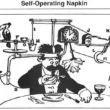| Posted: Mon Jul 16, 2007 11:44 am Post subject: The Empire Whines Back | |||||||
|
|
|||||||
| It should come as no surprise that the corporate media would object to a 2.0 world of citizens communicating outside the well-worn channels of mass media: monopolies always go down whining. However, the way in which the story of Whole Foods CEO John Mackey is being used in a broadside against those who have stepped outside the Establishment’s rules of discourse, and who attempt to shine light on the way that discourse has been hijacked, is particularly bald.From the facts as reported, what Mackey did was wrong. He never identified himself while he dissed a competitor and pumped his own company, its stock price, and his own haircut. Bad form all around, lad. Especially on the haircut.
The similarity between those acts, and my practice of writing on message boards posts that steer clear of Overstock’s stock price (and explicitly disclaim any opinion on this subject), and instead discuss a massive criminal conspiracy to defraud our nation’s capital markets that may end in 1929-style systemic failure, would be a similarity that may be lost on you. It was lost on me, too, especially given that I post in a way that is anything but anonymous (signing most of them “Patrick Byrne”, “Patrick”, “Patrick Byrne, CEO”, using either a user-name “Hannibal” which I initially forewarned and frequently reiterate is myself, or else, simply posting as “Patrick Byrne” on a message board called, “Take 5 With Patrick”). In short, given that Mackey’s posts touted his own stock anonymously, while my posts which avoid mention of the subject, discuss social issues beyond Overstock, and can only with great selective effort be read without understanding the identify of their author, one would think that any attempt at equating the two would be a superficiality too extreme even for the mass media to maintain. Yet once again, The New York Times has not let me down. New York Times reporter Brad Stone contacted me late last week for comment on the Mackey affair. The questions he emailed to me included,
In conversation with me Mr. Stone attempted the same gambit, trying to draw me out on the “extreme temptation” to which I was, apparently, succumbing, in daring to step outside the mass corporate media to raise public awareness of any issue that threatens our country. I requested (and he indicated acceptance) that he should not put words in my mouth, that I do not see exercising my duty as a citizen as an example of a “temptation” whose allure was too strong to withstand. As I wrote to him: “You became a journalist: would you have characterized this as having caved in to some ‘temptation’ that was too ‘extreme’ to withstand? Then why describe in such terms another’s decision to take part in the public discourse? ” On the general history of my postings and my identification therein, this is what I wrote him:
I continued with a number of posts representing a fair sample of my posts. Some were signed, “Patrick Byrne, CEO, Overstock.com”, some were signed just, “Patrick”. One would have thought that this answer was comprehensive and well-documented enough to be incapable of misrepresentation. But, once again, the New York Times reminds us once again of their agenda. Note this from today’s story:
While the New York Times asserts that I am “a high-profile figure[] who tried to exploit the anonymity of the Internet to promote their companies and combat enemies under false pretenses,” they have not done anything so tacky as adduce evidence to support this claim. They adduce no evidence that I have “tried to exploit the anonymity of the Internet” (which is right and appropriate, because it is a lie). Their attempt to characterize my efforts to bring public attention to a financial crime that may someday cause our nation’s capital markets to implode as an example of “promote their companies and combat enemies under false pretenses.” Again, they have done nothign so tacky as adducing evidence to support such these claims, no evidence that I have tried to “promote” Overstock, and no evidence of false pretenses. In fact, I would say that these are the most content-less allegations I have seen in awhile, going beyond what the normal hedge fund choagies do on their blogs (they at least have the grace to try to spin and lie about what I say, rather than simply fabricating allegations and hoping their brand carries the day, as the New York Times appears to be doing). Of course, they have a special problem to deal with: my claim, that our country is facing a financial scandal of epic proportions, is a claim that is being confirmed in reports and statements by Bloomberg, Forbes, SEC Chairman Cox, Commissioner Atkins, and numerous economists and analysts. How do they handle that one? They resort to a play right out of Choagie Playbook – 1st edition, which insists that no coverage be given to this scandal I am trying to expose, and instead characterize it only as an effort of mine to “combat enemies.” How long do they think they can keep the wig from slipping by just piling up misstatement upon lie upon fabrication? Here is the funny part: I don’t think Mr. Stone (whom I dealt with in his previous incarnation as a Newsweek reporter) is a bad reporter. But The New York Times has published a bad story. Myself, I see a strong editorial hand in this story. In fact, what is really going on is that the newspaper industry, which once had a monopoly on setting the Party Line, is now a buggy whip business. The average age of a newspaper reader is in his 50’s, and essentially no one under 30 subscribes to newspapers. New forms of journalism are fresher, more accurate, and waste less of the reader’s time kowtowing to the Establishment and its various corruptions, than does the mass media. Like all monopolies before it, it will fight to hold onto its monopoly. The naked shorting issue has developed under their noses with their full awareness, and in deference to the masters they serve they have kept quiet about it. With the facts finally and clearly lining up against them they have no resort but simply to stack their credibility chips as high as they can in an effort to steal the pot. This effort of The New York Times is noteworthy in that regard for its shamelessness, if not its originality. Incidentally, I love that they are doing this. I love putting my credibility on the line against The New York Times (and Wall Street Journal for that matter). Time and the facts are on my side. Your humble servant, PS Note that Mr. Stone summarized the above lengthy exposition with these words, “Byrne said that he never hides his true identity and always signs his name when he posts under his online handle, ‘Hannibal'”. As you can see from the email above, this is a flat misstatement. It has not, however, kept one of the hedge fund choagies from writing today, counting up the times I did not sign things “Hannibal,” but instead, “Patrick,” “Patrick Byrne,” and so on. The beat goes on: lie about what is said, and then disappear down a rat hole of “analysis” of those stretched and fabricated statements. it’s just another of the things I love about this story: it is a compendium of the flailing that occurs when the wig begins to slip on a degenerate Establishment. |
|||||||
Related Posts
Political Campaigns and Overstock
We often receive political complaints at Overstock . I am posting this so that in the future, when customer…
"On any other day, that might look strange.” – Nicholas Cage, Con Air
From: Sam E. Antar [mailto:[email protected]] Sent: Monday, January 28, 2008 7:22 PM To: Patrick Byrne Cc: [email protected] Subject:…
“On any other day, that might look strange.” – Nicholas Cage, Con Air
From: Sam E. Antar [mailto:[email protected]] Sent: Monday, January 28, 2008 7:22 PM To: Patrick Byrne Cc: [email protected] Subject:…
Integrity-Challenged Journalists Harm Children
The Salt Lake Tribune again provides example of the harm being done to society by shoddy, agenda-ridden journalism.…



